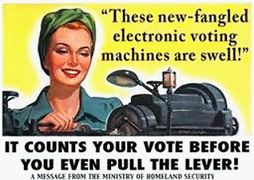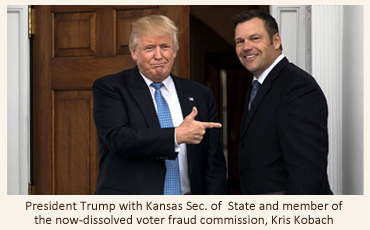Well this is disheartening ➡ Truth denied: Investigation into voter fraud thwarted.
 Despite the fact that there is overwhelming evidence of voter fraud in the 2016 election – from all across the country – President Trump just dissolved the very commission he created in May to investigate “vulnerabilities in voting systems and practices used for Federal elections that could lead to improper voter registrations and improper voting.”
Despite the fact that there is overwhelming evidence of voter fraud in the 2016 election – from all across the country – President Trump just dissolved the very commission he created in May to investigate “vulnerabilities in voting systems and practices used for Federal elections that could lead to improper voter registrations and improper voting.”
I don’t get it. As recently as last September it was discovered that Out-of-State Voters Changed the Outcome of the New Hampshire U.S. Senate Race. According to Kansas Secretary of State Kris W. Kobach ~
(F)acts have come to light that indicate that a pivotal, close election was likely changed through voter fraud on November 8, 2016: New Hampshire’s U.S. Senate Seat, and perhaps also New Hampshire’s four electoral college votes in the presidential election.
New Hampshire is one of fifteen states that allow same-day voter registration (which is really just begging for abuse of the election process) ~
According to statistics released by the Speaker of the New Hampshire House of Representatives, on the date of the general election in November 2016, there were 6,540 same-day registrants who registered to vote in New Hampshire using an out-of-state driver’s license to prove their identity.
Now if those 6,540 folks were really new Granite State residents they would have 60 days to obtain new driver’s licenses. However, as Kobach reported ~
It turns out that, as of August 30, 2017 – nearly ten months after the election – only 1,014 of the 6,540 same-day registrants who registered with an out-of-state license had obtained a New Hampshire driver’s license. The other 5,526 individuals never obtained a New Hampshire driver’s license. And, of those 5,526, only 213 registered a vehicle in New Hampshire.
Certainly suspicious enough to warrant a thorough investigation – and just for starters repeal same-day registration. As it was, the election was unquestionably affected by these “new” voters ~
If the presidential contest had been closer and had come down to a margin of three or four electoral college votes, then this voter fraud might have had extraordinary consequences. Regardless, in the Senate contest, it is highly likely that voting by nonresidents changed the result.

It was a report on duplicate voting from the Government Accounting Institute which led President Trump to establish his Advisory Commission on Election Integrity eight months ago. The commission was chaired by Vice President Pence, and the above-mentioned Kris Kobach was one of the group’s leaders.
Unfortunately, their requests for data, voting records, etc. from various states where fraud was suspected, were answered with a favorite leftist strategy: lawfare.
Von Spakovsky, senior fellow with the Heritage Foundation, along with J. Christian Adams, another member of the commission, discussed these underhanded tactics in a recent article at the Washington Examiner ~
Right off the bat, a third of the states flatly refused to give the commission the voter registration and voter history data we requested—even though it is supposed to be publicly available information. States routinely provide that same data to political parties, candidates, and other third parties.
There are only two possible explanations for their refusal: either they were part of the partisan “resist-Trump-at-any-costs movement,” or they were afraid of what we might find.
Additionally, a swarm of meritless lawsuits, filed by progressive groups, hobbled our ability to make progress on our assignment.
Yeah, when you have to cheat to win elections, of course you have to lie and obfuscate to cover it up ~
The litigation strategy was to force our staff to devote all their time to responding to frivolous lawsuits, thereby sabotaging the commission’s ability to function.
And sadly, it worked. But let’s hope this is just a temporary setback. Von Spakovsky and Adams conclude their article on a positive note ~
It’s a shame that the commission’s efforts to study and accurately define the problem were thwarted. Well-funded advocacy groups, activist academics, and other individuals who are not credible worked to undermine and sabotage the commission’s work. Those who opposed this civic effort have now forfeited their seat at the table.
The good news is that, although the commission has been disbanded, we and others dedicated to protecting our democratic system will continue our work to fix the vulnerabilities in our election process. Those who opposed the commission may delight in its dissolution, but before long they’ll see that advocates of election integrity have more stamina, perseverance, and the support of the people.
Preventing, deterring, and prosecuting such fraud is essential to protecting
the integrity of our voting process. ~ The Heritage Foundation
~~~~~~~~~~~~~~
Related:
About that voter fraud…
Voter Fraud Cases from Across the United States ~ Database compiled by the Heritage Foundation includes nearly 1100 occurrences since 2000 (many involve only individuals). They’re not just allegations; most resulted in criminal convictions.




